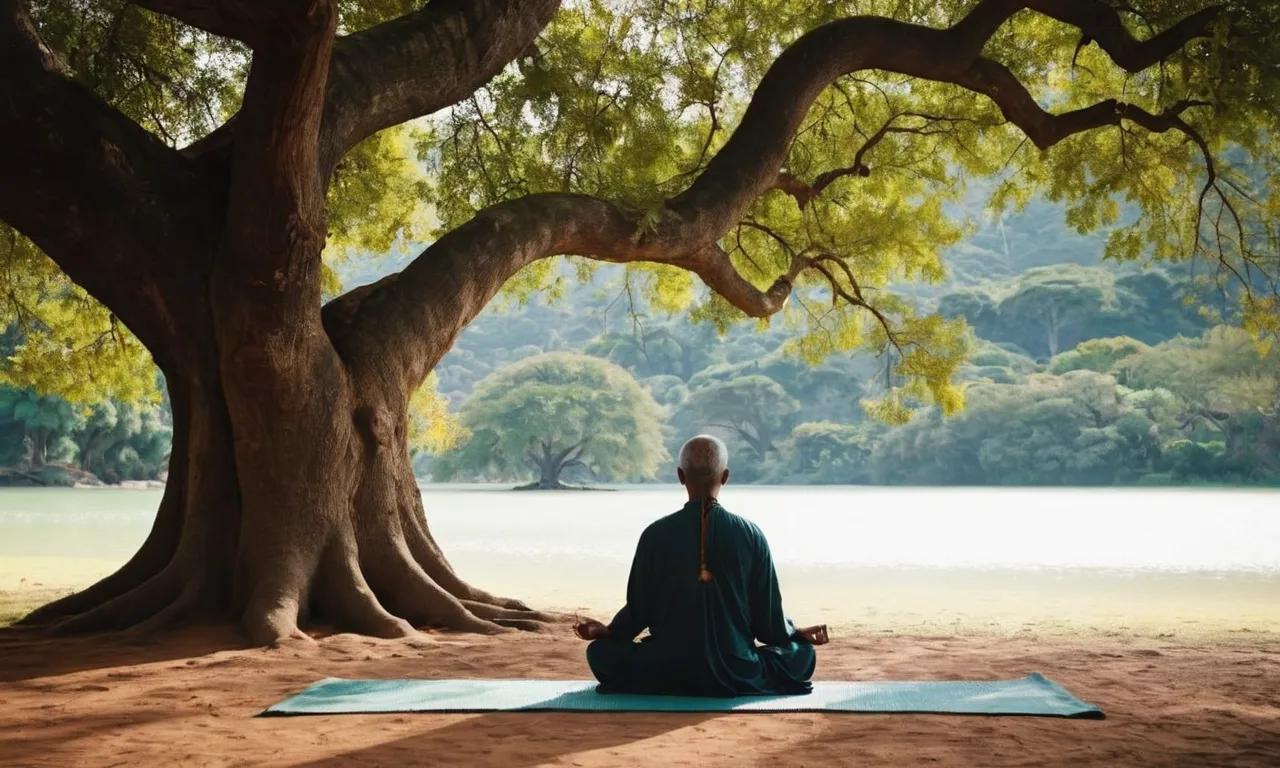Why I Left Christianity For Buddhism
If you were raised Christian but feel doubtful about your faith, you’re not alone. Many people who grew up Christian end up leaving the religion as they get older. I’m one of those people. After over 20 years as a practicing Christian, I made the difficult decision to convert to Buddhism.
If you’re short on time, here’s the quick answer: I left Christianity because I struggled with certain Christian beliefs that didn’t align with my values and worldview. I was drawn to Buddhism because of its focus on cultivating inner peace, its emphasis on compassion, and its evidence-based practices.
I Struggled With Key Aspects of Christian Theology
The concept of original sin
One of the core tenets of Christianity is the doctrine of original sin. This teaching states that all humans are born with sin due to the fall of Adam and Eve in the Garden of Eden. As descendants of Adam and Eve, we have inherited their sinful nature.
No matter how good of a life we try to live, we are intrinsically flawed and unworthy of salvation on our own merits. This pessimistic view of human nature was difficult for me to accept. While humans are certainly capable of selfishness and wrongdoing, I believe we are born morally neutral, not fully corrupted.
The existence of hell
Most Christians believe that those who do not accept Jesus Christ as their lord and savior are destined for eternal punishment in hell after death. Only by accepting God’s mercy can we escape this fate.
Yet the idea that a just and loving God would condemn billions of non-Christians, including many morally upright individuals, to infinite torture struck me as excessive. Surely a compassionate God would not deal in such absolutes of heaven or hell, reward or punishment.
The Buddha’s teaching that our actions determine our karma and rebirth seemed much more consistent with reality.
Salvation through faith alone
Many Christians emphasize salvation by faith alone. They argue that human effort means nothing; only acceptance of God’s grace can save us. While faith may be important, this devaluation of works felt counterintuitive.
In life, achievements usually require striving and actions, not merely stated belief. If we want to accomplish something meaningful – master a craft, improve society, or attain enlightenment – we must put in dedicated effort.
Buddhism recognizes this truth by stressing the importance of the Eightfold Path. Moral conduct, mental discipline, and wisdom are all needed for any spiritual growth.
Buddhism Was More Aligned With My Worldview
Buddhism encourages free inquiry
One of the key aspects that drew me to Buddhism was its emphasis on free inquiry and seeking truth for oneself. Buddhism encourages its followers to question and test its teachings, rather than accept them blindly. This resonated with my tendency to question and analyze beliefs before accepting them.
As I learned more about Buddhism, I found that its teachings stood up to rigorous questioning and testing. The Buddha himself said, “Do not accept anything by mere tradition. Do not accept anything just because it accords with your scriptures.
Do not accept anything merely because it agrees with your pre-conceived notions. Do not accept anything merely because it accords with your speculations. Do not accept anything merely because it pleases your fancy. Do not accept anything merely because the exponent seems trustworthy.
But after observation and analysis, when it agrees with reason and is conducive to the good and the benefit of all, accept it and live up to it.” This emphasis on free inquiry was liberating compared to some forms of Christianity that require unquestioning faith.
Buddhism focuses on cultivating inner peace
I was drawn to how Buddhism is intensely focused on cultivating inner peace, wisdom, and enlightenment. While Christianity also values peace and wisdom, Buddhism is wholly dedicated to providing a clear path for people to reduce suffering and find true lasting happiness.
The Buddha laid out the Noble Eightfold Path and other detailed teachings precisely for this purpose.
What appealed to me about Buddhism was its concrete practices for spiritual development. From meditation to ethics to wisdom, I found Buddhist teachings wonderfully systematic and pragmatic for fostering inner transformation.
I learned techniques like mindfulness meditation and loving-kindness meditation that profoundly impacted my inner peace and serenity.
Buddhism emphasizes compassion
As a philosophical orientation focused on reducing suffering, Buddhism places great emphasis on cultivating compassion for all beings. Its teachings center around recognizing the universal nature of suffering and how we are all interconnected.
Concepts like karma and rebirth reinforced for me the oneness of all life and importance of compassion. Buddhism’s focus on compassion resonated strongly with me—more so than Christianity’s orientation, in my opinion.
The Buddha taught that we could transform our minds to overcome self-centeredness and connect with all beings at a heart level, even our enemies. This teaching had a strong pull and felt intuitively truer than similar Christian commandments to love thy neighbor.
The Mindfulness and Meditation Practices Resonated With Me
As someone who grew up in a Christian household, I was always taught to look outward for answers – to pray to God for guidance, to find meaning in ancient Biblical texts. Though these practices brought me comfort throughout my youth, as I grew into adulthood I found myself craving a more inward-focused spirituality.
This drew me to explore the mindfulness and meditation practices of Buddhism.
What resonated most with me about Buddhist meditation was its emphasis on being fully present. By training the mind to focus on the breath, on bodily sensations, on the present moment, I began to find a sense of calm and contentment that had always eluded me before.
Whereas my Christian upbringing emphasized quieting the mind through prayer, Buddhist meditation encouraged truly observing the workings of the mind without judgement. This felt revolutionary to me.
In particular, Vipassana meditation was transformative. By systematically scanning the body for sensations, I learned to become an impartial witness to my own experience. Rather than getting caught up in mental narratives about the past or future, I began to find happiness and wisdom in the here and now.
Letting go of attachment and aversion freed me from much of the anxiety and angst I’d always carried with me.
Beyond formal seated meditation, I also found great meaning in mindfulness practices. Staying present while eating, walking, working, conversing, etc. helped me to fully appreciate each moment of life – to not gloss over the mundane details but to find profundity in the simple acts of living.
This felt like a true antidote to the tendency in Christianity to focus on the afterlife instead of daily existence.
Though Buddhism lacks the concept of a Creator God which I had always clung to, its practices fill that void with presence. By learning to listen within, I connect to something vast, eternal, and whole. The Kingdom of Heaven is here in each breath, each step, each bite.
This mindful presence has given me a sense of meaning and belonging I’d never felt before in all my years of Christian worship.
Buddhism Felt More Flexible and Open
After years of practicing Christianity, I began to feel unsatisfied with some of its core tenets. The idea of an eternal hell for non-believers troubled me, as I could not reconcile a loving God with eternal damnation.
Additionally, Christianity’s focus on sin, judgment, and the afterlife seemed to distract from living an ethical life here and now. When I began exploring Buddhism, I was struck by its flexibility, openness, and emphasis on cultivating compassion and wisdom in the present moment.
Here are some of the key reasons Buddhism felt more flexible and open to me:
No requirement for a belief in God or the supernatural. Buddhism is non-theistic and does not require beliefs that contradict reason or science. The Buddha emphasized realizing truths through direct experience rather than faith in doctrines. This empirical approach resonated with me.Acceptance of uncertainty. Buddhism acknowledges the existence of doubt and uncertainty in life. It encourages its practitioners to investigate spiritual truths for themselves, rather than accept dogmatic teachings. Buddhism’s openness to uncertainty allowed me the freedom to keep questioning.Focus on spiritual practice over religious label. In Buddhism, adopting the label “Buddhist” is less important than actually practicing mindfulness, meditation, ethics, and wisdom. Buddhism is more concerned with practical transformation through training the mind and heart than identifying as a member of the club.Encourages exploration of other religions. Buddhist teachers often say that practicing Buddhism does not mean you cannot learn from other religions such as Christianity. Many Buddhists explore multiple religious traditions rather than believing only Buddhism contains the truth.Teaches that goodness is innate. The Buddhist view of basic human goodness clashed with Christianity’s doctrine of original sin, which holds that people are innately flawed. Buddhism’s teaching that compassion and goodness reside in everyone resonated strongly.Values reason and empiricism. Buddhism invites practitioners to test its teachings through direct experience and investigation, rather than rely solely on faith. The Buddha instructed his followers to not blindly believe traditions but rather to use reason, evidence, and personal experience to determine what is true.
This empirical approach resonated with me.
While Christianity felt rigidly dogmatic and reliant on supernatural claims at odds with science, Buddhism offered flexibility, openness to uncertainty, and practices for cultivating compassion. Buddhism’s empirical approach, focused more on spiritual practice than adhering to fixed beliefs or labels, aligned with my own sensibilities.
I felt it offered fertile ground for an evolving understanding of timeless truths. The transition allowed me to retain the helpful aspects of Christianity while exploring a more flexible approach to spirituality.
Conclusion
In the end, my spiritual journey led me away from the faith I grew up with and toward the Buddhist path. This wasn’t an easy or quick decision, but after years of questioning, challenging, and re-examining my beliefs, I felt Buddhism was the best fit for my values and worldview.
Converting religions is intensely personal, but sharing our stories helps us feel less alone in our journeys.








